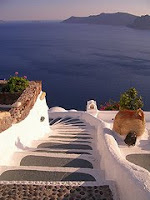OK, so health care passed. Some people I've talked to are angry, some are depressed. Both of these are natural and to be expected, but let's not go overboard. I'm reading blog posts that make it sound like the world is ending and we will all be judged on this one event.
History is full of horrible events, some of which make this look like fun. I'm not saying that I'm OK with it (just read my earlier blog posts on health care) but let's not lose sight of reality. As Christians we know the end of the story - God wins, and we are saved through His grace and mercy. There should be nothing on this Earth that causes us to lose hope.
My mother used to say to us when we whined about something bad "what's the worst that could happen?" In this case, the worst is pretty bad. 300,000 more children could lose their lives each year (an estimate based on results of existing public funding of abortions in Medicaid). The American economy could be devastated for decades to come. Our democracy could be at an end. And yet is it so different from where we were the day before health care passed? We already had over 1,000,000 children being killed each year, and expanded funding for it oversees to help it grow in other countries. Our economy already tanked under a staggering amount of debt, and our democracy and constitution have been spat on and attacked almost daily. Our government is fiddling while we burn.
Oh my, now it sounds even worse! My point is not to sugar coat the situation, nor to bury us under a mountain of trouble, but to say "take heart". We can fix this. We just need to work together. Perhaps this is the crisis that will be our wake up call. Americans always seem to pull together better when there is a crisis (like 9-11, or Pearl Harbor).
I can't find the darn quote I want right now, but it goes something like "We will be judged not on what we accomplished but why what we attempted." If that's not a "real" quote it is now, as I just said it.
"Eternal Father, I offer you the Body and Blood, Soul and Divinity of Your Dearly Beloved Son, Our Lord Jesus Christ, in atonement for our sins, and those of the whole world.
For the sake of His sorrowful Passion, have mercy on us, and on the whole world."
History is full of horrible events, some of which make this look like fun. I'm not saying that I'm OK with it (just read my earlier blog posts on health care) but let's not lose sight of reality. As Christians we know the end of the story - God wins, and we are saved through His grace and mercy. There should be nothing on this Earth that causes us to lose hope.
My mother used to say to us when we whined about something bad "what's the worst that could happen?" In this case, the worst is pretty bad. 300,000 more children could lose their lives each year (an estimate based on results of existing public funding of abortions in Medicaid). The American economy could be devastated for decades to come. Our democracy could be at an end. And yet is it so different from where we were the day before health care passed? We already had over 1,000,000 children being killed each year, and expanded funding for it oversees to help it grow in other countries. Our economy already tanked under a staggering amount of debt, and our democracy and constitution have been spat on and attacked almost daily. Our government is fiddling while we burn.
Oh my, now it sounds even worse! My point is not to sugar coat the situation, nor to bury us under a mountain of trouble, but to say "take heart". We can fix this. We just need to work together. Perhaps this is the crisis that will be our wake up call. Americans always seem to pull together better when there is a crisis (like 9-11, or Pearl Harbor).
I can't find the darn quote I want right now, but it goes something like "We will be judged not on what we accomplished but why what we attempted." If that's not a "real" quote it is now, as I just said it.
"Eternal Father, I offer you the Body and Blood, Soul and Divinity of Your Dearly Beloved Son, Our Lord Jesus Christ, in atonement for our sins, and those of the whole world.
For the sake of His sorrowful Passion, have mercy on us, and on the whole world."



















